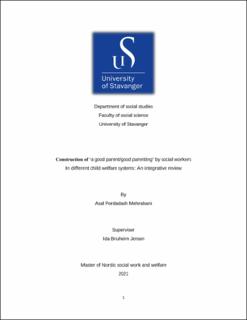| dc.description.abstract | The current research aimed to explore how social workers are constructing who are good parents and which factors were associated with good parenting in the different child welfare systems. Being a good enough parent is one of the main concerns for the all countries to protect the children from the possible harms and not sufficient caring because the children are the future adults for the society. Children are considered the vulnerable group who might be victims of the parents in their home even in the early years of their life. They require support and protection in their life. the primary caregivers sometimes (mothers and fathers) who the children trust and need them to live safely and healthy might suffer harm, abuse, and neglect. It does not mean parents are considered the bad parents from the society’s viewpoints, especially child welfare systems, are evil and they do not at all care about their children’s physical, emotional, and safe life. The social and cultural structures have a key role in the definition of good parenting or who can be regarded as good parents. Also, in this process of construction ‘being good parents’ child welfare systems regardless of which kind of orientation they follow, have the power to determine this concept for the families as a social reality. Social workers are officially responsible from the states to provide well-being to the children by following the guidelines and rules of the child welfare system in the society. Their power comes from this idea: Children who grow up in a safe environment and have better caring in varied aspects can become healthier adults in the future.
Although they believe the responsibilities of caring for children firstly belong to their own families, the child welfare system has its right to monitor and control the families and children to reduce possible risks and harms. So, social workers ‘viewpoints as frontline and who are in direct connection with the parents and children have the most effective role in constructing normal or bad parents. They have professional experiences, educated, skills, and knowledge for judgment and deciding for the parents.
In my opinion, it is so significant to focus on the other side of the reality of good parents or normal parents, the social worker’s perception because it will help to improve the system and prevent misjudgment and even misunderstanding of social workers about being good enough parents.
So, in the current review study, I studied social workers 'understandings of what good parenting and a good parent entails and how they construct this concept in different child welfare systems. The integrative literature review as the method was chosen to reach a comparative perspective by reviewing and synthesizing the previous studies. These selected researches belonged to the different child welfare systems. The findings indicated social workers of three child welfare systems had more similarities than differences in their understandings. Good parents were understood by social workers in similar viewpoints. It means that parents who care and provide for the essential needs of their children such as physical, emotional, safety, and protection from harm and abuse, were considered good parents. The main points resulting from my reviewing articles indicated that social workers have a key impact on determination what will be normal or abnormal in the child welfare context and the power that exists in the child welfare system and especially social workers have the main role in the construction of reality of the normal parents in the societies so they make decisions and judge the qualification of parents by their power. Indeed, the gender-based views about the parents cause different expectations from the mothers to compare to the fathers in caring for the children and the mothers are the primary responsibility to meet the needs of their children. | |
